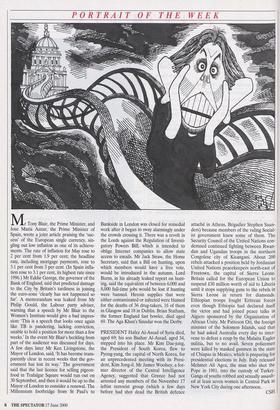PORTRAIT OF THE WEEK
Mr Tony Blair, the Prime Minister, and Jose Maria Aznar, the Prime Minister of Spain, wrote a joint article praising the 'suc- cess' of the European single currency, sin- gling out low inflation as one of its achieve- ments. The rate of inflation for May rose to 2 per cent from 1.9 per cent; the headline rate, including mortgage payments, rose to 3.1 per cent from 3 per cent. (In Spain infla- tion rose to 3.1 per cent, its highest rate since 1996.) Mr Eddie George, the governor of the Bank of England, said that predicted damage to the City by Britain's tardiness in joining the euro-zone 'clearly has not happened so far'. A memorandum was leaked from Mr Philip Gould, the Labour party adviser, warning that a speech by Mr Blair to the Women's Institute would give a bad impres- sion: 'This is a speech that looks once again like TB is pandering, lacking conviction, unable to hold a position for more than a few weeks.' In the event Mr Blaif s heckling from part of the audience was discussed for days. A few days later Mr Ken Livingstone, the Mayor of London, said, 'It has become trans- parently clear in recent weeks that the gov- ernment has lost its way.' The government said that the last licence for selling pigeon- food in Trafalgar Square would run out on 30 September, and then it would be up to the Mayor of London to consider a renewal. The Millennium footbridge from St Paul's to Bankside in London was closed for remedial work after it began to sway alarmingly under the crowds crossing it. There was a revolt in the Lords against the Regulation of Investi- gatory Powers Bill, which is intended to oblige Internet companies to allow state access to emails. Mr Jack Straw, the Home Secretary, said that a Bill on hunting, upon which members would have a free vote, would be introduced in the autumn. Lord Burns, in his already leaked report on hunt- ing, said the equivalent of between 6,000 and 8,000 full-time jobs would be lost if hunting were banned. Heroin supplies that were either contaminated or infected were blamed for the deaths of 36 drug-takers, 16 of them in Glasgow and 18 in Dublin. Brian Statham, the former England fast bowler, died aged 69. The Aga Khan's Shuidar won the Derby.
PRESIDENT Hafez Al-Assad of Syria died, aged 69; his son Bashar Al-Assad, aged 34, stepped into his place. Mr Kim Dae-jung, the President of South Korea, flew to Pyong-yang, the capital of North Korea, for an unprecedented meeting with its Presi- dent, Kim Jong-il. Mr James Woolsey, a for- mer director of the Central Intelligence Agency, suggested that Greece had not arrested any members of the November 17 leftist terrorist group (which a few days before had shot dead the British defence attaché in Athens, Brigadier Stephen Saun- ders) because members of the ruling Social- ist government knew some of them. The Security Council of the United Nations con- demned continued fighting between Rwan- dan and Ugandan troops in the northern Congolese city of Kisangani. About 200 rebels attacked a position held by Jordanian United Nations peacekeepers north-east of Freetown, the capital of Sierra Leone. Britain called for the European Union to suspend £30 million worth of aid to Liberia until it stops supplying guns to the rebels in Sierra Leone in return for diamonds. Ethiopian troops fought Eritrean forces even though Ethiopia had declared itself the victor and had joined peace talks in Algiers sponsored by the Organisation of African Unity. Mr Patteson Oti, the foreign minister of the Solomon Islands, said that he had asked Australia every day to inter- vene to defeat a coup by the Malaita Eagles militia, but to no avail. Seven policemen were killed by masked gunmen in the state of Chiapas in Mexico, which is preparing for presidential elections in July. Italy released Mehmet Ali Agca, the man who shot the Pope in 1981, into the custody of Turkey. Gangs of youths robbed and sexually assault- ed at least seven women in Central Park in New York City during one afternoon. CSH










































































 Previous page
Previous page